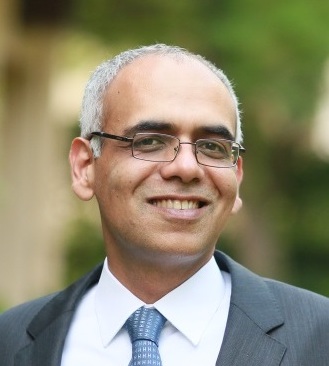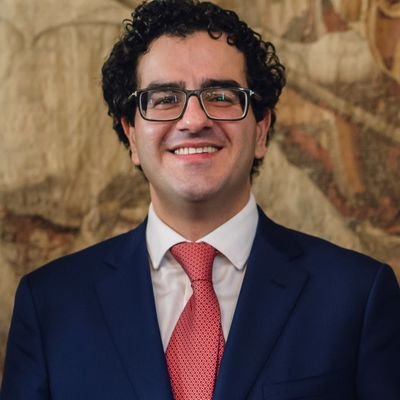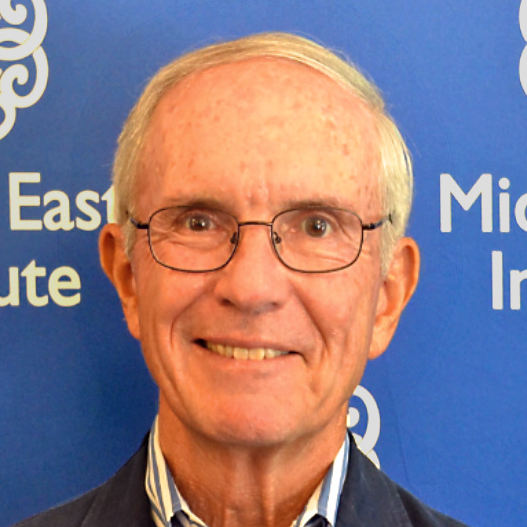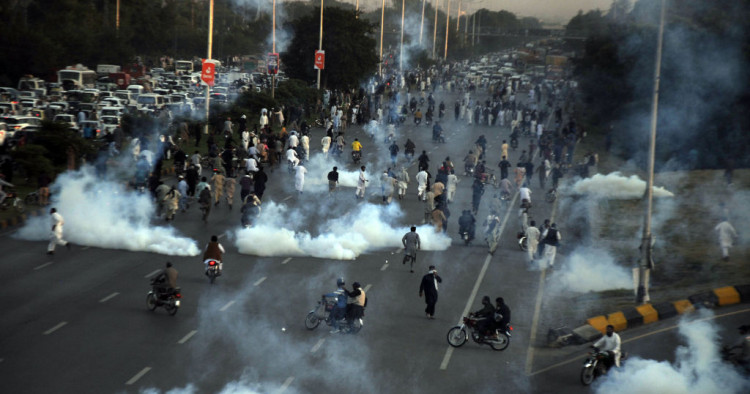Contents:
- With Khan barred from public office, political turmoil compounds Pakistan’s multiple woes
- Drone sanctions highlight EU’s policy dilemma on Iran
- Romania and Azerbaijan sign new deal on LNG supplies
- Saudi-South Africa deals highlight Riyadh’s diversification drive
With Khan barred from public office, political turmoil compounds Pakistan’s multiple woes
Syed Mohammad Ali
Non-Resident Scholar

-
Pakistan has been gripped by political turmoil since former Prime Minister Khan was removed from office earlier in April, and the election commission’s recent attempt to bar him from contesting elections will help fuel his bid to reclaim power.
-
The ensuing political uncertainty will surely draw focus away from the plight of flood victims as well as discourage foreign aid and investment that is needed to bolster the extremely stressed national economy.
Already struggling with economic troubles compounded by catastrophic flooding that has inundated a third of the country, Pakistan recently experienced yet another political shock. This past Friday, the Election Commission barred former Prime Minister Imran Khan from contesting general elections for a period of five years for making false statements concerning the sale of gifts sent to him by Saudi and Emirati rulers while he was in office.
Khan’s supporters have decried this decision, and Khan turned to the judiciary to challenge the authority of the electoral watchdog to disqualify him from running for public office over a graft accusation. The federal high court has made an initial observation that Khan can still contest two special by-elections scheduled for next week, Oct. 30, but it will wait for a more detailed Election Commission verdict before further deliberating on this matter.
Pakistan has been gripped by political turmoil since Khan was removed from office earlier in April, after losing a vote of no confidence orchestrated by a coalition of rival political parties. Khan, the former cricketer and a philanthropist-turned-populist politician, had accused the United States of orchestrating his ouster due to his insistence on pursuing an independent foreign policy. Khan’s claims resonated with the public, which has grown increasingly critical of the U.S. as the transactional bilateral relationship was tested to its limit during the lengthy American occupation of neighboring Afghanistan.
Khan came to power in 2018 promising to bring transparency to government and rid the country of the scourge of corruption. However, Khan himself had to rely on many “electables,” who became affluent via questionable means, to win the elections. And once in office, Khan’s accountability drive was largely confined to persecuting political opponents, while his economic performance was also lackluster. Though initially backed by the powerful military establishment, Khan’s relationship with the Pakistani Armed Forces became strained when he hesitated to endorse the army chief’s appointment of a new head of the intelligence service.
Being thrown out of power may have actually boosted the populist former prime minister’s popularity, and since then he has been trying to pressure the incumbent coalition government to concede to early elections in the hope of coming back with a larger majority. Last month’s calamitous monsoon flooding diverted public attention from Khan’s drive to resume power, but the Election Commission’s attempt to bar Khan from contesting elections, alongside the dismissal of varied corruption cases against his political rivals, will reinvigorate his bid to reclaim power. Still, the ensuing uncertainty in the country will surely draw focus away from the plight of flood victims. Likewise, it may very well discourage foreign aid and investment that is needed to bolster the extremely stressed national economy — which otherwise could have been facilitated by Pakistan’s removal, a few days ago, from the global terrorism financing gray list.
Drone sanctions highlight EU’s policy dilemma on Iran
Abdolrasool Divsallar
Non-Resident Scholar

-
The EU sanctioned three Iranian individuals and one entity for supplying drones to Russia for use in Ukraine, but these measures are symbolic and will do little to affect Iran’s decision-making.
-
The fact that the EU has gradually lost its leverage over Iran has put it in a difficult position. For now, Tehran views Brussels as an irrelevant power.
On Oct. 20, the European Council sanctioned three Iranian individuals and one Iranian entity for supplying combat drones to Russia for use in Ukraine. All four have been added to the list of those subject to restrictions for undermining or threatening Ukraine’s territorial integrity, sovereignty, and independence. Their assets are frozen, European Union citizens and companies are barred from providing them with funds, and the three individuals face a ban on travel to or through the EU.
However, these measures are only symbolic. They will do little to affect Iran’s decision to deliver security assistance to Russia and will not give Europe any new leverage.
First, the new sanctions have almost no impact on the interests and operational capacity of the individuals in question. The sanctions target military officers from the General Staff of the Armed Forces, the Islamic Revolutionary Guard Corps (IRGC), and the Ministry of Defense who rarely travel outside Iran, let alone to Europe. Due to their sensitive military positions, these figures are subject to strict security protection measures by Iranian counter-intelligence services, contributing to their minimal foreign exposure. In addition, the United States had previously imposed strict sanctions on Shahed Aviation Industries and other critical institutions involved in Iran’s drone programs.
Second, Iranian officials have already made their strategic choice about future of relations with Europe. From Tehran’s perspective, the global balance of power is shifting against European interests, and the EU will have a less prominent role in the future. Moreover, the bloc is perceived as lacking strategic autonomy and thus as incapable of impacting broader U.S.-Iran relations, for better or worse. Europe’s inability to act independently of the U.S.’s “maximum pressure” campaign, its criticism of Iran’s missile program and human rights violations, and its warmer relations with Arab states have shaped Tehran’s view of the Europeans as unworthy partners for the Islamic Republic. Thus, Iranian officials are becoming increasingly indifferent about the deterioration of their relations with the EU.
Third, European leaders are also wary about escalating tensions with Iran and, thus, cannot project an image of a decisive power. Like their U.S. counterparts, they are unwilling to close off a diplomatic path to resolve the dispute over Iran’s nuclear program when there are no reliable alternatives to the Joint Comprehensive Plan of Action (JCPOA). The collapse of the JCPOA is a recipe for instability in the EU’s Southern Neighborhood, while pursuing a military option against Iran during the war in Ukraine could seriously constrain efforts to contain Moscow.
The EU is facing a major policy dilemma when it comes to Iran. The diplomatic approach has shown its limits, but raising tensions at this moment could turn into a strategic mistake too. The fact that the EU has gradually lost its leverage toward Iran has put it in a difficult position. For now, Tehran views Brussels as an irrelevant power. Unless Europe has a proper plan to restore its policy instruments and rebuild leverage, its capacity to respond will remain limited and the EU’s Iran policy will continue to be fractured.
Follow on Twitter: @Divsallar
Romania and Azerbaijan sign new deal on LNG supplies
Iulia-Sabina Joja
Director, Frontier Europe Initiative; Project Director, Afghanistan Watch

-
Compelled by Russian energy blackmail, the EU has tried to identify short-term solutions to overcome the continent’s dependence on Moscow, with one option being Caspian-basin volumes transported via the South Caucasus, Turkey, and the Black Sea.
-
Speeding up the latest Azerbaijani-Romanian LNG project would make a significant difference not just to Romania but to landlocked and energy-poor Moldova, Hungary, and Slovakia.
On Oct. 19, Romania’s energy producer Romgaz signed a memorandum of understanding (MoU) with Azerbaijan’s energy company SOCAR for the transportation of liquefied natural gas (LNG) from the Caspian Sea to the Romanian Black Sea port in Constanța. The agreement includes Georgia, where one terminal will be built. And it was struck as news emerged that Turkish President Recep Tayyip Erdoğan would accept a Russian offer to turn Turkey into a regional gas supply hub.
Last week’s LNG MoU was the second such agreement signed between Romania and Azerbaijan since 2010. Romania had sought funding from the European Union for that earlier project until 2017, arguing that it would directly aid the EU’s most important energy security priority — diversification away from Russian gas. But those efforts to secure EU support came to naught, and in fact, Brussels had not invested in any major diversification effort between 2017 and the full-scale Russian invasion of Ukraine in 2022. Now, the ball is again in the EU’s court, although the Romgaz-SOCAR LNG agreement does clarify who will finance the project — the feasibility study will be paid for by the Romanian and Azerbaijani companies themselves. Romanian Prime Minister Nicolae Ciucă promised, when he signing the MoU, that this study will be finalized “in a very short amount of time.”
Compelled by Russian energy blackmail since late winter, the EU has tried to identify short-term solutions to overcome the continent’s dependence on Moscow. But the next few years will be key for achieving lasting energy independence from Russia and a balanced and diverse mix of suppliers. For the past two years, Azerbaijan has delivered gas to the EU through the so-called Southern Gas Corridor, a network of east-west pipelines originating from offshore gas fields in the Caspian; but its longest link, the Trans-Anatolian Natural Gas Pipeline (TANAP), which runs through Turkey to the Greek border, has limited capacity. Bulgaria, meanwhile, is racing to build an interconnector to the Southern Gas Corridor to supply Southeastern European energy infrastructure with additional Caspian gas. LNG has become a viable alternative to Russian pipeline gas, but Europe lacks sufficient LNG ports. Speeding up the Azerbaijani-Romanian project would make a significant difference not just to Romania but to landlocked and energy-poor Moldova, Hungary, and Slovakia and, depending on the volumes, could even flow through pipelines further westward.
If the EU proves able to invest in this project and expedite it, this assistance might also help bolster Europe’s foothold in the South Caucasus more generally. Brussels recently approved a short-term border monitoring mission for Armenia and Azerbaijan and has emerged as the lead broker of peace talks between the two countries. As embattled Russia continues to create a power vacuum in the South Caucasus, the EU needs to step in to ensure regional stabilization and productive peace talks. Increasingly, the South Caucasus needs the EU as much as the EU needs the region — for achieving energy security in Europe and stability in this vulnerable neighborhood.
Follow on Twitter: @IuliJo
Saudi-South Africa deals highlight Riyadh’s diversification drive
Thomas W. Lippman
Non-Resident Scholar

-
Over the past decade, Saudi Arabia has ramped up its diversification efforts and a vigorous private sector is expanding steadily in agriculture, industry, and services.
-
The South Africa deals fit in with Saudi Arabia’s policy under Crown Prince Mohammed bin Salman of separating the kingdom from its economic and strategic dependence on the U.S.
The economic development agreements between Saudi Arabia and South Africa signed last week during a visit to the kingdom by South African President Cyril Ramaphosa represent another building block in Riyadh’s accelerating drive to diversify its economy away from oil.
Saudi Arabia is flush with cash because of the worldwide surge in oil prices, but its economic planning since the 1970s has recognized that oil revenue is finite and the country must diversify as its population expands. For years that policy was more talk than action, but over the past decade it has taken hold. A vigorous private sector is expanding steadily in agriculture, industry, and services.
According to a recent analysis by Jadwa Investment Group in Riyadh, “Since the start of the year, Jadwa’s non-oil private sector composite index has been trending upwards, with some sectors performing better than we have previously anticipated. As such, we now see higher growth in three sectors: ‘(non-oil) Manufacturing’, ‘Wholesale & Retail Trade, Restaurants & Hotels’, and ‘Transport, Storage and Communication’. As a result, we now expect overall GDP growth for Saudi Arabia to hit 8.7 percent (vs. 7.7 percent previously). Within this, we see oil GDP rising year-on-year, at 16.6 percent (vs. 15.5 previously), and non-oil growth rising by 4.3 percent, primarily due to higher non-oil private sector growth of 4.4 percent (vs. 3.4 percent previously).”
The South African package bolsters that trend. Details of the agreements and memorandums of understanding were not made public, but officials of both countries said they envision cooperation and investment in renewable energy, industry, mining, tourism, logistics, and agriculture.
The South Africa deals, like the recent agreement with the group known as OPEC+ to boost oil prices through a modest decrease in output, also fit in with Saudi Arabia’s policy under Crown Prince Mohammed bin Salman of separating the kingdom from its decades-long economic and strategic dependence on the United States. The South Africa agreements link the Arab world’s biggest economy with the second-biggest in Africa.
Ramaphosa said Saudi Arabia is seeking to join BRICS, an anagram for Brazil, Russia, India, China, and South Africa, major developing nations promoting each other’s economies. He said Saudi Arabia’s application would be considered at a BRICS summit in South Africa early next year.
Photo by Muhammad Reza/Anadolu Agency via Getty Images
The Middle East Institute (MEI) is an independent, non-partisan, non-for-profit, educational organization. It does not engage in advocacy and its scholars’ opinions are their own. MEI welcomes financial donations, but retains sole editorial control over its work and its publications reflect only the authors’ views. For a listing of MEI donors, please click here.













